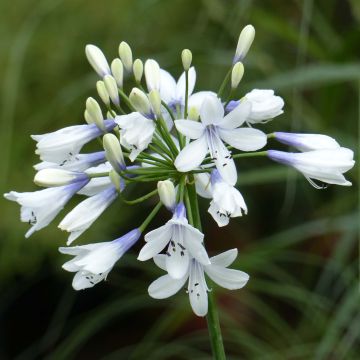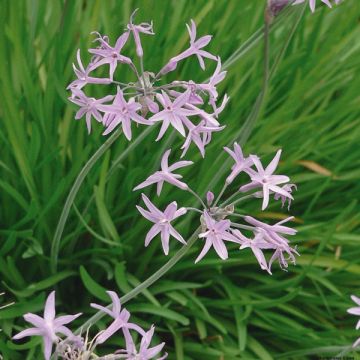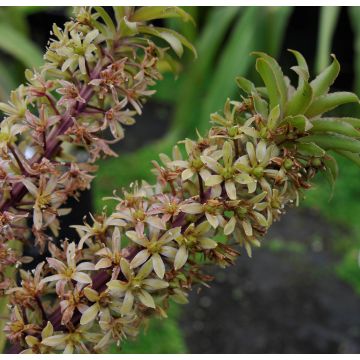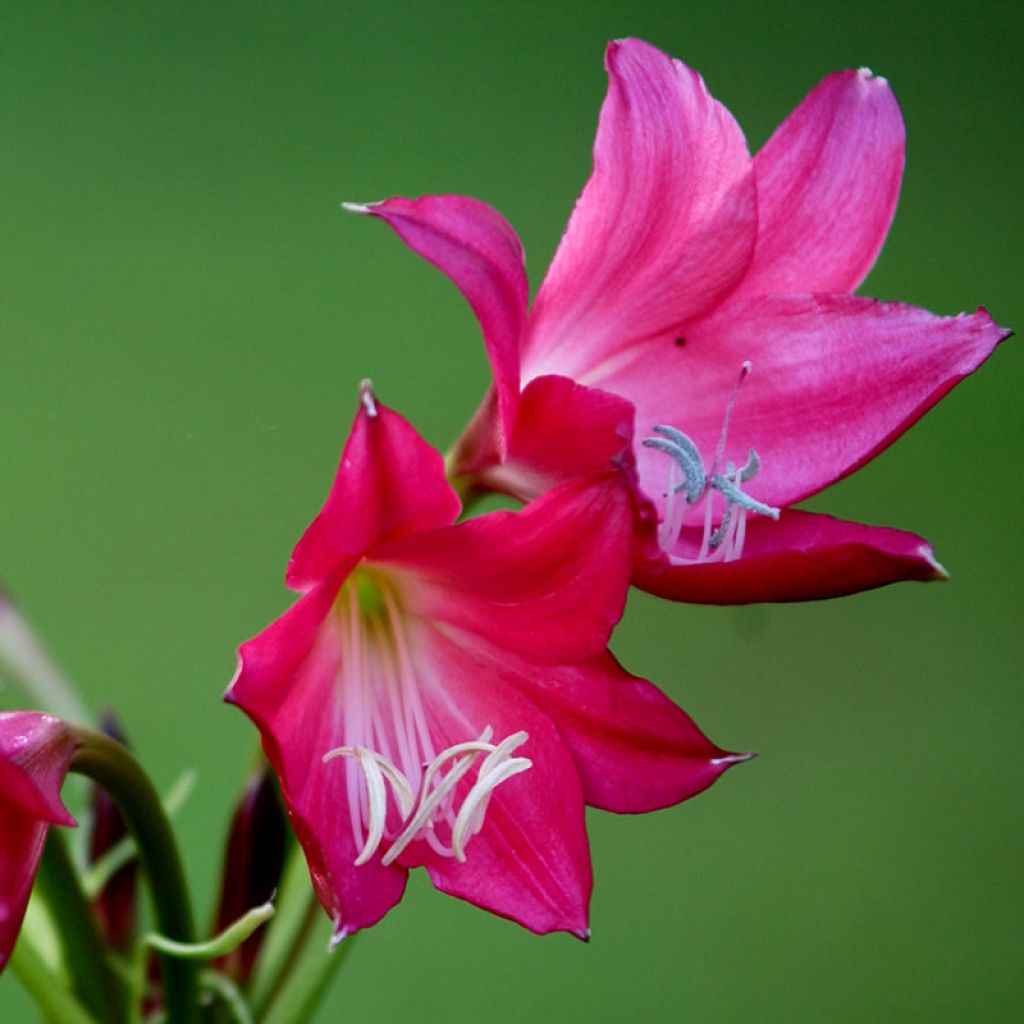

Crinum moorei Ellen Bosanquet
Crinum Ellen Bosanquet
Crinum Ellen Bosanquet
Swamp Lily, Crinum Lily, Spider Lily
Bulbs in perfect condition, received in 2023. 1 out of 3 flowered in 2024 and again this year. Very large flowers on a tall, sturdy stem, in August. Stunning but... one small drawback: the color doesn't match the promised color at all. It's a very pale pink, almost white. Will the other two be carmine like in the PdF photo? We'll see next year perhaps.
BobAin, 21/08/2025
Special offer!
Receive a €20 voucher for any order over €90 (excluding delivery costs, credit notes, and plastic-free options)!
1- Add your favorite plants to your cart.
2- Once you have reached €90, confirm your order (you can even choose the delivery date!).
3- As soon as your order is shipped, you will receive an email containing your voucher code, valid for 3 months (90 days).
Your voucher is unique and can only be used once, for any order with a minimum value of €20, excluding delivery costs.
Can be combined with other current offers, non-divisible and non-refundable.
Home or relay delivery (depending on size and destination)
Schedule delivery date,
and select date in basket
This plant carries a 6 months recovery warranty
More information
We guarantee the quality of our plants for a full growing cycle, and will replace at our expense any plant that fails to recover under normal climatic and planting conditions.
Would this plant suit my garden?
Set up your Plantfit profile →
Description
Crinum Ellen Bosanquet is a fairly hardy perennial bulbous plant, bearing tall, large umbels of flowers resembling brightly carmine pink lilies in summer. Its corn-like foliage generally disappears during flowering. It is easy to grow in shade and prefers loose and well-drained soils.
Crinum Ellen Bosanquet is a bulbous plant related to Amaryllis, both genera belong to the Amaryllidaceae family. The Ellen Bosanquet variety develops from a very large bulb (8-10 cm (3-4in) in diameter), with a very long 'neck' (10-20 cm (4-8in)) that usually emerges above the ground. At the very beginning of spring, leaves over 5 cm (2in) wide and 50 cm (20in) long appear, spread out in a star shape at the top of the neck, with a texture like maize leaves. The flower stalks appear in summer (July-August), and reach 80 cm (32in) to 1m (3ft) high. They bear umbels of 10 large flowers resembling brightly carmine pink lilies at their tips, which open successively in star-shaped, 10 cm (4in) long trumpets. All floral parts are white to white-pink, including the filaments of the stamens and the styles. The very wide leaves generally begin to wither when the flowers bloom.
Crinums live for many years (20 and more), without being replanted, forming large clumps over time. With good fertilisation and regular watering in summer, the vegetation becomes very impressive, with a long summer flowering. If the climate in your region is not too harsh, you can plant Crinum Ellen Bosanquet in a shaded area, in a clear understory with soil that retains moisture. It will blend well with amaryllis belladona, toad lilies (Tricyrtis formosana), wild arums, and ferns. This plant is fabulous for creating large pots in the shade on the terrace or balcony, or near an entrance.
Report an error about the product description
Crinum Ellen Bosanquet in pictures
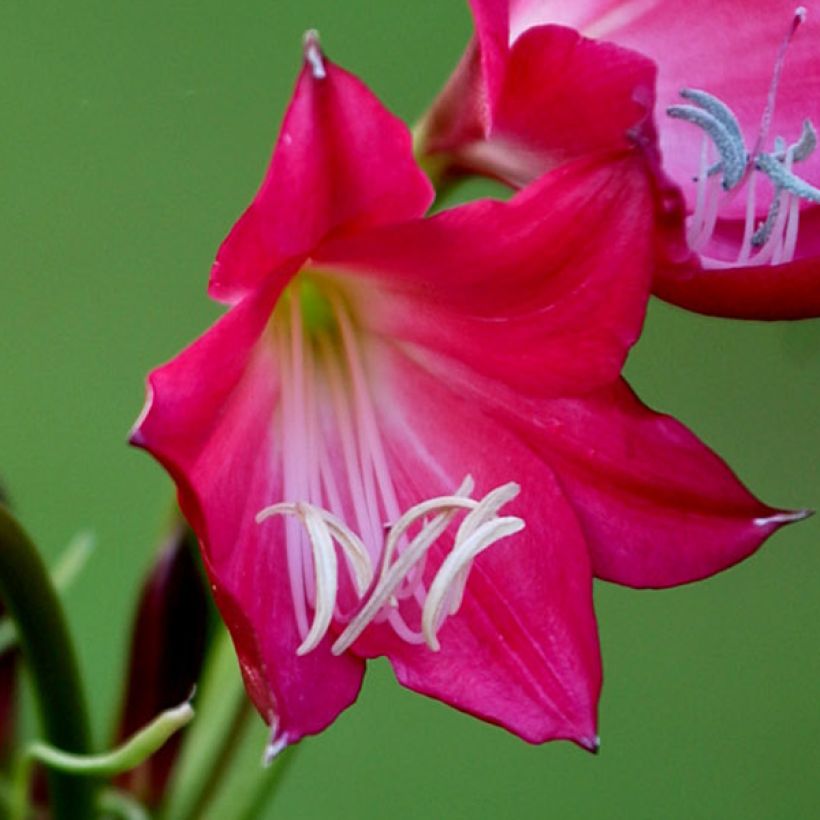

Plant habit
Flowering
Foliage
Botanical data
Crinum
Ellen Bosanquet
Amaryllidaceae
Swamp Lily, Crinum Lily, Spider Lily
Cultivar or hybrid
Planting and care
In its native habitat, Crinum Ellen Bosanquet grows in shaded areas, along streams. This plant is hardy to -10°C (14°F). Its elegant, soft green palm-like foliage can easily be damaged by frosts of -5°C (23°F), but it will reappear in March. Plant the bulb in spring, in loose, rich, moist, but well-drained soil. A mix of ordinary soil, leaf compost, and sand will be perfect. Plant this crinole in a shaded area, as the sun can burn its foliage. In moderate climates, it is advisable to apply a thick mulch to protect the crown in winter or consider growing it in a container for overwintering in an unheated space, sheltered from severe frosts.
Planting period
Intended location
Care
-
, onOrder confirmed
Reply from on Promesse de fleurs
Similar products
Haven't found what you were looking for?
Hardiness is the lowest winter temperature a plant can endure without suffering serious damage or even dying. However, hardiness is affected by location (a sheltered area, such as a patio), protection (winter cover) and soil type (hardiness is improved by well-drained soil).

Photo Sharing Terms & Conditions
In order to encourage gardeners to interact and share their experiences, Promesse de fleurs offers various media enabling content to be uploaded onto its Site - in particular via the ‘Photo sharing’ module.
The User agrees to refrain from:
- Posting any content that is illegal, prejudicial, insulting, racist, inciteful to hatred, revisionist, contrary to public decency, that infringes on privacy or on the privacy rights of third parties, in particular the publicity rights of persons and goods, intellectual property rights, or the right to privacy.
- Submitting content on behalf of a third party;
- Impersonate the identity of a third party and/or publish any personal information about a third party;
In general, the User undertakes to refrain from any unethical behaviour.
All Content (in particular text, comments, files, images, photos, videos, creative works, etc.), which may be subject to property or intellectual property rights, image or other private rights, shall remain the property of the User, subject to the limited rights granted by the terms of the licence granted by Promesse de fleurs as stated below. Users are at liberty to publish or not to publish such Content on the Site, notably via the ‘Photo Sharing’ facility, and accept that this Content shall be made public and freely accessible, notably on the Internet.
Users further acknowledge, undertake to have ,and guarantee that they hold all necessary rights and permissions to publish such material on the Site, in particular with regard to the legislation in force pertaining to any privacy, property, intellectual property, image, or contractual rights, or rights of any other nature. By publishing such Content on the Site, Users acknowledge accepting full liability as publishers of the Content within the meaning of the law, and grant Promesse de fleurs, free of charge, an inclusive, worldwide licence for the said Content for the entire duration of its publication, including all reproduction, representation, up/downloading, displaying, performing, transmission, and storage rights.
Users also grant permission for their name to be linked to the Content and accept that this link may not always be made available.
By engaging in posting material, Users consent to their Content becoming automatically accessible on the Internet, in particular on other sites and/or blogs and/or web pages of the Promesse de fleurs site, including in particular social pages and the Promesse de fleurs catalogue.
Users may secure the removal of entrusted content free of charge by issuing a simple request via our contact form.
The flowering period indicated on our website applies to countries and regions located in USDA zone 8 (France, the United Kingdom, Ireland, the Netherlands, etc.)
It will vary according to where you live:
- In zones 9 to 10 (Italy, Spain, Greece, etc.), flowering will occur about 2 to 4 weeks earlier.
- In zones 6 to 7 (Germany, Poland, Slovenia, and lower mountainous regions), flowering will be delayed by 2 to 3 weeks.
- In zone 5 (Central Europe, Scandinavia), blooming will be delayed by 3 to 5 weeks.
In temperate climates, pruning of spring-flowering shrubs (forsythia, spireas, etc.) should be done just after flowering.
Pruning of summer-flowering shrubs (Indian Lilac, Perovskia, etc.) can be done in winter or spring.
In cold regions as well as with frost-sensitive plants, avoid pruning too early when severe frosts may still occur.
The planting period indicated on our website applies to countries and regions located in USDA zone 8 (France, United Kingdom, Ireland, Netherlands).
It will vary according to where you live:
- In Mediterranean zones (Marseille, Madrid, Milan, etc.), autumn and winter are the best planting periods.
- In continental zones (Strasbourg, Munich, Vienna, etc.), delay planting by 2 to 3 weeks in spring and bring it forward by 2 to 4 weeks in autumn.
- In mountainous regions (the Alps, Pyrenees, Carpathians, etc.), it is best to plant in late spring (May-June) or late summer (August-September).
The harvesting period indicated on our website applies to countries and regions in USDA zone 8 (France, England, Ireland, the Netherlands).
In colder areas (Scandinavia, Poland, Austria...) fruit and vegetable harvests are likely to be delayed by 3-4 weeks.
In warmer areas (Italy, Spain, Greece, etc.), harvesting will probably take place earlier, depending on weather conditions.
The sowing periods indicated on our website apply to countries and regions within USDA Zone 8 (France, UK, Ireland, Netherlands).
In colder areas (Scandinavia, Poland, Austria...), delay any outdoor sowing by 3-4 weeks, or sow under glass.
In warmer climes (Italy, Spain, Greece, etc.), bring outdoor sowing forward by a few weeks.
































